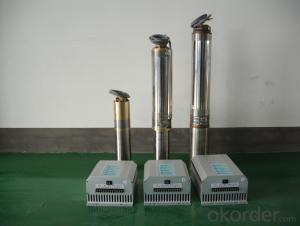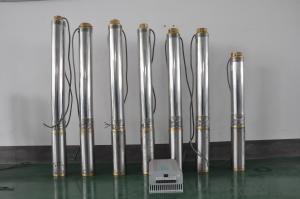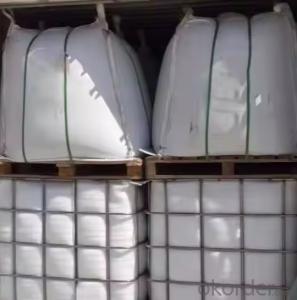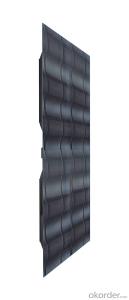Solar Pump (DC)
- Loading Port:
- China Main Port
- Payment Terms:
- TT OR LC
- Min Order Qty:
- -
- Supply Capability:
- -
OKorder Service Pledge
OKorder Financial Service
You Might Also Like
Item Description :
This superb new addition to our solar fountain range comes with a 10w solar panel,and a powerful fountain pump that is capable of producing fountains of up to 2m in height. As well as being easy to set up and use.Instruction manual is supplied for assembly and maintenance.
Solar Fountain Key Features :
Powered by direct sunlight
No high voltage electric mains required
Safe for children
Max. height of fountain: 2M
Max. flow capacity: 800 L/H(176 GAL)
10W Polycrystalline solar panel included
18V DC brushless pump
Solar Pump Features :
Can produce fountains up to : 2M (tube height) 1.4M (fountain height)
Comes with multiple nozzle accessories
Cable Length : 5M
Solar Panel Features :
10W peak power.
Polycrystalline highly efficient solar panel
Comes mounted in aluminium frame
Comes with ground stake and rotating knob so you can angle your panel toward the sun
What You Will Get :
10W solar panel
Solar pump
Ground Sake
Nozzle accessories
Precautions :
DO NOT alter or change the product itself or its components
Operate pump in freshwater only, never above 50 degrees celsius
Keep away from flammable liquids
Do not connect to any other power supply other than the included
- Q:How does a solar pump handle power fluctuations or surges?
- A solar pump typically handles power fluctuations or surges by utilizing a built-in controller that regulates the power input. This controller adjusts the pump's speed or output accordingly to maintain optimal performance and prevent damage from voltage spikes. Additionally, some solar pumps may have protective features such as surge suppressors or voltage stabilizers to further safeguard against power fluctuations.
- Q:What is the cost of installing a solar pump?
- The cost of installing a solar pump can vary depending on several factors such as the size and capacity of the pump, location, and specific requirements of the installation. On average, a basic solar pump installation can range from $5,000 to $15,000, including the cost of the pump, solar panels, controller, and installation labor. However, it is recommended to consult with a professional installer to get an accurate estimate based on your specific needs and location.
- Q:How does a solar pump help in reducing the use of chemical fertilizers?
- A solar pump helps in reducing the use of chemical fertilizers by providing a sustainable and renewable source of energy for irrigation. By using solar power, farmers can irrigate their crops without relying on conventional pumps that are usually powered by fossil fuels. This not only reduces the carbon footprint but also eliminates the need for transporting and storing chemical fertilizers, as the solar pump ensures a consistent water supply for the crops. Consequently, the reliance on chemical fertilizers is decreased, promoting more environmentally friendly and organic farming practices.
- Q:How does a solar pump handle low water levels?
- A solar pump is equipped with a sensor that detects low water levels. When the water level drops below a certain point, the pump automatically shuts off to prevent damage to the motor. Once the water level rises again, the pump resumes its operation, ensuring efficient and reliable water supply.
- Q:Can a solar pump be used in commercial agriculture?
- Certainly, commercial agriculture can utilize solar pumps. Solar pumps serve as an eco-friendly and economically viable solution for irrigation in agricultural fields. By utilizing solar energy to power the pumps, the need for electricity or fuel is eliminated. This attribute makes them especially suitable for remote areas lacking reliable access to grid electricity. For commercial agriculture, solar pumps present numerous advantages. They ensure a consistent and dependable water supply, which is crucial for crop growth and yield. Furthermore, these pumps can be easily scaled to meet the water demands of expansive agricultural operations. Furthermore, solar pumps boast low operational and maintenance costs when compared to conventional pumps. Once installed, they require minimal upkeep and have a long lifespan. Consequently, commercial farmers can significantly reduce their reliance on costly diesel or electric pumps, making solar pumps an economically sound choice. Furthermore, the adoption of solar pumps in commercial agriculture can bring about positive environmental impacts. By harnessing solar energy, these pumps contribute to the reduction of greenhouse gas emissions and promote sustainable farming practices. This aligns with the global trend towards more sustainable and eco-friendly agricultural methods. In conclusion, solar pumps are indeed applicable to commercial agriculture. They offer a dependable, economically viable, and environmentally friendly solution for irrigation in agricultural fields, thus making them a feasible option for commercial farmers.
- Q:Are solar pumps suitable for use in amusement parks?
- Yes, solar pumps can be a suitable option for use in amusement parks. Solar-powered pumps are cost-effective, environmentally friendly, and can provide a reliable source of water for various applications within amusement parks, such as decorative fountains, water rides, or irrigation systems. The use of solar pumps can help reduce operating costs, decrease dependence on traditional energy sources, and contribute to the park's sustainability efforts.
- Q:Can a solar pump be used in areas with limited access to financing options for installation or maintenance?
- Yes, a solar pump can be used in areas with limited access to financing options for installation or maintenance. Solar pumps are a cost-effective and sustainable solution for water pumping, as they do not require electricity or fuel costs. They can be installed and maintained by local communities or organizations with minimal technical expertise, reducing the need for expensive professional services. Additionally, solar pumps have a longer lifespan and lower operating costs compared to traditional pumps, making them a viable option even in economically constrained areas.
- Q:How does a solar pump help in reducing the risk of electrical accidents?
- A solar pump helps in reducing the risk of electrical accidents by eliminating the need for electrical connections and power sources, as it operates solely on solar energy. This eliminates the risk of electrical shock, short circuits, and other electrical accidents that can occur when using traditional pumps powered by electricity.
- Q:Can a solar pump be used for water supply in agricultural research facilities?
- Certainly, water supply in agricultural research facilities can be achieved using a solar pump. Solar pumps offer an efficient and environmentally-friendly alternative to traditional pumps that rely on electricity or fuel. By harnessing solar energy, these pumps can operate in remote areas or places with limited access to electricity. In agricultural research facilities, solar pumps can fulfill various water supply needs such as irrigation systems, hydroponic setups, or livestock watering. Depending on the facility's requirements, they can be easily integrated into existing infrastructure or used as independent systems. Solar pumps bring long-term cost-effectiveness by reducing energy expenses, while also playing a significant role in lowering carbon emissions and lessening dependence on fossil fuels. Moreover, they require minimal maintenance and boast a lengthy lifespan, making them a dependable solution for water supply in agricultural research facilities.
- Q:How do solar pumps handle water with high fluoride or chemical content?
- Solar pumps do not have a specific mechanism to handle water with high fluoride or chemical content. However, the filtration system used in solar pumps can help remove some impurities from the water, including certain chemicals and contaminants. It is important to note that the effectiveness of this filtration process may vary depending on the specific chemicals or fluoride levels present in the water. In cases of extremely high levels, additional treatment methods might be necessary to ensure the water is safe for consumption or other purposes.
1. Manufacturer Overview |
|
|---|---|
| Location | |
| Year Established | |
| Annual Output Value | |
| Main Markets | |
| Company Certifications | |
2. Manufacturer Certificates |
|
|---|---|
| a) Certification Name | |
| Range | |
| Reference | |
| Validity Period | |
3. Manufacturer Capability |
|
|---|---|
| a)Trade Capacity | |
| Nearest Port | |
| Export Percentage | |
| No.of Employees in Trade Department | |
| Language Spoken: | |
| b)Factory Information | |
| Factory Size: | |
| No. of Production Lines | |
| Contract Manufacturing | |
| Product Price Range | |
Send your message to us
Solar Pump (DC)
- Loading Port:
- China Main Port
- Payment Terms:
- TT OR LC
- Min Order Qty:
- -
- Supply Capability:
- -
OKorder Service Pledge
OKorder Financial Service
Similar products
New products
Hot products
Related keywords


























